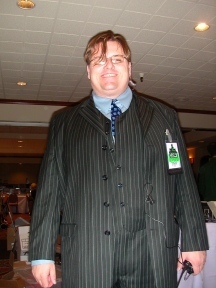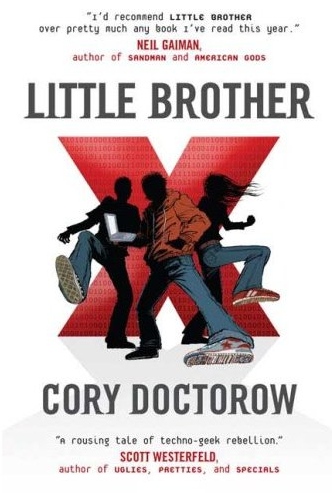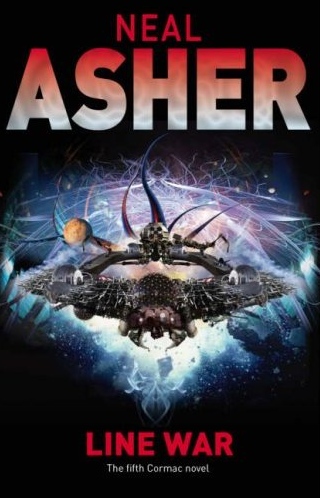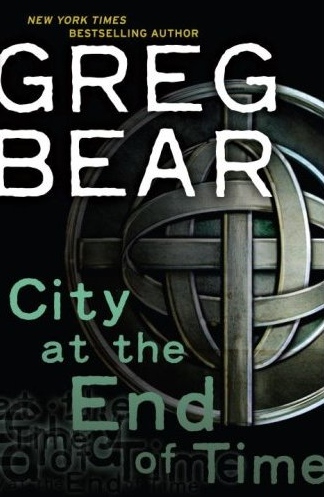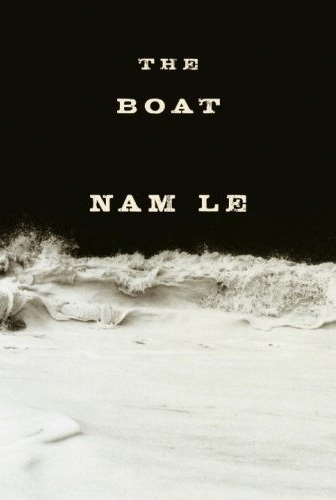|
|
|
|
This Just In...News
From The Agony Column
|
| |
|
05-09-08: Nam Le Voyages Aboard 'The Boat' ; Agony Column Podcast News
Report : An Interview with Marga Gomez
|
The Symmetry of
Home
"That's all I've
ever done, traffic in words," the narrator tells us. He's a Vietnamese
man, once a lawyer, now in the Iowa Writer's Workshop. Not unlike author
Nam Le, who won a fellowship from the Iowa Writer's Workshop
as well as a passel of prizes. So when he manages to publish a first book
of short stories, going against the grain and inclinations of most major
publishing houses, you can guess it is well worth your valuable time.
But 'The Boat' (Alfred A. Knopf / Random House ; May 13, 2008 ; $22.95)
should be on your radar for another reason as well. The title story first
found publication in Conjunctions,
a journal of occasionally weird fiction that published an
issue by the "New Wave Fabulists" three years ago and has
continued to offer work that skirts the edges of genre and literary fiction.
Nam Le is no genre author, though the stories in this book will have a
lot of appeal to genre fiction readers as well as literary readers looking
for nothing more than the highest quality writing to be found between
hard covers. Le delivers that in stories like "Love and Pity and
Pride and Compassion and Sacrifice," in which the narrator finds
himself hosting a demanding father with ties to an infamous atrocity.
"Cartagena" is a gritty, immersive look at the life of a fourteen-year-old
hit man (think City of God in prose – it has that kind
of immediacy) that was first published in A
Public Space. As you read through the colophon page, take notes.
Zoetrope: All Story, One Story – Le's publishing
resume tells a pretty impressive story itself.
Le writes in a remarkable variety of voices and tones, with prose so transparent
you won't necessarily even notice that you're reading. Like Le, you'll
simply disappear into the people and lives he creates. He does so in depth,
with at least three of the stories coming in at novella length, including
the previously unpublished "Halflead Bay", which picks up on
the theme of fathers and sons from a radically different perspective.
Another heretofore unpublished story, "Tehran Calling", is an
unexpected thriller set in the Iranian capital. In fact, you'll have a
hard time finding common threads here besides stellar writing. Le traffics
in words, all right. You'll want to pay attention.
|
Agony Column Podcast
News Report : A Phone Interview with Marga Gomez : Comedy Vs. Tragedy
Marga Gomez
has that most fearsome and envious of all jobs – she's a comedian.
She's appearing in Santa Cruz for "Women's Voices – A Night
of Comedy" and I was lucky enough to get her on the phone before
she arrived. The event is to benefit WomenCARE,
a cancer advocacy organization. No, I didn't plan to theme the week –
sometimes these things just happen. But I was happy to speak with Gomez;
and you'll be happy I did as well. Here's
the MP3 – listen up!
|
| |
|
05-08-08: Mario Guslandi Reviews 'The New Weird' ; Agony Column Podcast
News Report : A Conversation With Jeremy Lassen
|
Movement Versus
Fiction
|
A
new bee for your bonnet. |
I like having Mario
Guslandi review for this site, as he's willing to read and review material
that he knows may not be to his taste. Or at least that I suspect may
not be to his taste. So I enthused over 'The New Weird' earlier on, and
even interviewed the editors,
Jeff and Anne VanderMeer. You
can find Mario's review of the book here; and I think he does a fine
job. I'd buy 'The New Weird' based on his review; but then, I'm known
to have eccentric tastes, which were I assigned the task of reviewing
myself, might be the kindest thing I'd say.
|
Agony Column Podcast
News Report : A Conversation With Jeremy Lassen
It's been too long
since I've spoken with Agony Column regular Jeremy Lassen,
and today's podcast corrects this error borne from an excess of riches.
I wrote Jeremy to see what was on his mind in the world of publishing
and genre fiction, as we head out of the Nebulous Awards and drive toward
the Hugo's. There are a lot of wild mood shifts in the genres these days,
as everyone tries to keep afoot in a real world that gives science fiction,
horror and fantasy a run for their money with regards to science fiction,
horror and fantasy content. It's frankly pretty tough to keep up with
the latest science fictional intrusions into reality, The Horrors in the
Headlines (I'm pretty sure Lovecraft would have got to that title given
the opportunity), and the fantasies of those who would tell us what reality
is made from. It's all the stuff of dreams, or nightmares, -- or Awards
-- depending on your perspective. Here's
what Jeremy and I had to say about it.
|
| |
|
05-07-08: A Review of 'Pretty Is What Changes' ; Agony Column Podcast
News Report : An Interview With Bookseller Steve Bercu
|
Following Science,
Leading Society
And finally, a
review of Jessica Queller's memoir 'Pretty Is What Changes'.
This wasn't the sort of book that I usually even look at, let alone read
and enjoy. But it didn't take more than a couple of pages for me to slip
into Queller's crystalline vision of science, ethics and impossible choices.
I'll admit, I believe that my naiveté was an aid in enjoying this
book. I truly didn't know what to expect, or what Queller would decide.
Suffice it to say that she lets the reader live her decisions with strong,
clear prose. There's nothing in between the reader and Queller's experience,
which makes each new bit of information, each new decision as present
for the reader as it was for the writer. Great pacing helps as well, as
does a surprise ending. Not so long ago this would have been hailed as
a great, human, character-oriented science fiction novel. What happened
to Queller is no longer the realm of science fiction. The impossible is
rocketing into the realm of the possible. 'Pretty Is What Changes' preserves
those moments of change, pretty and otherwise.
|
Agony Column Podcast
News Report : An Interview With Bookseller Steve Bercu : Book People
It's back to the booksellers
today, as
I talk to Steve Bercu, one of the owners of Book
People, a huge bookstore in Austin, Texas. And you know, even as we're
told that the economy is quite firmly lodged where no hand dares to follow,
Bercu offers a startlingly optimistic perception of independent bookselling
and the future of the book, as well as the bricks-and-mortar bookstore.
Here's a man who knows that books smell good – and here's the interview.
Damn, if I could drive to Austin, I'd attend that event he describes;
imagine 3,000 readers. As it happens, this does not belong solely in the
realm of the imagination.
|
| |
|
05-06-08: Time for a Roundup ; A 2008 Interview With Jessica Queller,
Part 2
|
A Glimpse at the
Present and the Future
It's been a while,
hasnt it? Since I've done an old-fashioned, thrown 'em on the table
and let readers sort 'em out roundup? If you've been looking at the Rolling
Shelves, you've seen some interesting stuff up there, and now, I'm going
to take it down and share. It's a quick and dirty, lax and lazy deal,
but if you read yesterday's news, you'll know I sort of maxed out. Here's
as close to a vacation as I'm going to get. It's not everything, but it
should be enough to put a dent in your pocketbook.
So, in case you've been under a rock, or trapped in the systems closet
with whirring fans and overheating servers, there's a new novel by Cory
Doctorow out this moment. 'Little Brother' (Tor Books / Tom Doherty
Associates ; April 29, 2008 ; $17.95) should, like 'Pretty Is What Changes'
be pretty much of a mega-bestseller, the much sought-after successor to
a certain English schoolteacher's books. It's sort of a YA book, in that
the main characters are teenagers caught up in a Department of Homeland
Security sweep. What happens afterwards is pure Doctorow; hilarious, fact-based,
a story where ideas and adrenaline merge and leave your mind as thrillingly
exhausted as your body might be were you to be the one on the run. It's
a new Doctorow novel, he's touring like mad, there are all sorts
of Instructables web links, Doctorow
has built out a web site where he's giving away the book in electronic
form, it's the bee's knees for everyone who has a mind and enjoys
using it. Try not to oversell it to your kids. That'll be the hard part,
trust me. 'Cos they'll enjoy the hell out of it if your own enthusiasm
doesn't take it too far into the realm of the uncool.
You might not need to have hidden under that rock to miss the new Neal
Asher novel, 'Line War' (Tor UK / Pan Macmillan ; April 30, 2008
; £17.99). These babies are pretty hard to get in from the UK, but
as ever, always worth the effort. This is the fifth Ian Cormac Polity
novel, and Asher's having as much fun as ever. In this case, that means
the return of Mr. Crane, the Brass Man, another appearance from Orlandine,
the woman who is in some sense an analogue of both Cormac and Crane, and
even Mika and the Dragon. Whatever the hell it is that is attacking the
Polity is getting more aggressive and more mysterious. Count on crosses,
double-crosses and probably a crucifixion or two; count on Neal Asher
to kick your ass in the way only Neal Asher can, with larger-than-life
getting re-defined two or three times in the course of the novel.
And finally to conclude today's trifecta, it's the man who brought you
'Blood Music'. Greg Bear is back with big-ol' book titled
'City at the End of Time' (Del Rey / Random House ; August 12, 2008 ;
$27). Bear is a master of offering gritty visions of the present combined
with sprawling vistas of the future, and that precisely defines what's
happening here; three young people are getting glimpses of an almost incomprehensible
future. This can't bode well for them, the present or the future. For
the readers, however, it bodes very well.
|
"I took the test a second time"
Today's podcast is
the
second part of my interview with Jessica Queller,
as we spoke about her book 'Pretty is What Changes'. Now for me, one of
the great appeals of this book was the sense of tension it generated,
and the surprises it held. I approached it with a totally hands-off methodology,
and found that Queller's sense of story was so compelling and powerful,
I was often just shocked at what she described. And I think that readers
and listeners will be as well, since the coda to the whole story is really
quite sensational. Never have I wanted a writer to pursue a sequel as
I do Queller. She knows how to keep you glued to the pages, and what happens
next, is well, not surprisingly, like yet another science fiction story.
Made human, made real. It's happening to a real woman in our real world,
a world, alas, that has changed in the time it took me to read –
and again in the time it took you to read it. Queller's fine book will
take just a bit more time to read; correspondingly, expect more change
in your life, from within your reading experience and in the world around
you.
|
| |
|
05-05-08: A 2008 Interview with Jessica Queller
|
'Pretty Is What
Changes'
I have many excuses;
there are no excuses.
It's odd, the ways I find books. Certainly, many are mailed to me, and
I go through them assiduously. I visit KUSP and find books in a pile in
my producer's office. I even spend a fair amount of time in bookstores,
combing the shelves, and find more right out there that I never suspected
to exist. I was at Capitola Book
Café looking at bookshelves I had never before suspected to
exist, one evening after an interview. There in the back room where shelves
full of ARCs (Advance Reading Copies), which it had never occurred to
me might get sent to bookstores as well as reviewers. Always curious,
I started pulling things down, including something I might not have glanced
at otherwise; 'Pretty Is What Changes' (Spiegel & Grau / Random House
; April 1, 2008 ; $24.95) by Jessica Queller. Standing
there in the dingy light, I opened it up and started reading, and within
a couple of minutes was drawn in to an intense and compellingly-written
story of a woman who found herself just ever so slightly ahead of the
cutting edge of science. Twenty years ago this book would have been science
fiction, to be filed with works like 'Flowers for Algernon'. But what
I was reading was not science fiction; it was the story of what happens
when science overtakes our ability to create a social fabric, a shared
milieu for coping with the choices advanced technology sets before us.
Queller's book simply tells the story of what happened before and after
she took the BRCA gene test, to learn if she had the breast cancer gene.
If this test comes back positive, a woman may be told that she has an
87% chance of developing breast cancer; most doctors will advise a prophylactic
double mastectomy. Queller watched her grandmother and her mother die,
in the manner that so many of us now experience; swaddled in the machinery
of modern medicine. Her writing is powerful, precise and treads a very
fine line with total confidence. 'Pretty Is What Changes' is a striking
memoir of life lived as science fiction becomes part of our everyday lives,
as technology passes the societal structures meant to help us make wise
choices.
For readers of science fiction – and many who come here hope to
find new works in that genre – this is an amazing first-person character
study, yes, a memoir, of how technology impacts our lives and changes
them for good and ill in the same uncaring stroke. It's the story of how
we have to manufacture new forms of bravery, of how our swiftly changing
world demands the imagination be engaged in each and every moment just
to make sure we survive and live well. Queller writes with an engaging
sense of humor and an unsparing eye for horror.
Our original interview was to take place on Good Friday on the lot at
Universal Studios, but as it happened, the lot was closed for the holiday.
She was kind enough to invite me to her lovely house in Hollywood. I have
to admit that I found the whole experience discomfiting; from reading
the book to speaking with the author. She was gracious and genial, and
as you can hear in the first part of our interview, a wonderful speaker.
Still, the whole deal threw me for a loop, and shortly thereafter, I was
tossed into a series of NPR projects. And, to be honest, I needed some
time to, as we say in this modern world, process the interview. To bring
it into focus, and allow myself to hear it.
We actually got along so well that the interview ran well over an hour,
so I'm splitting it into two podcasts. But dont think that everything
is in the interview. Queller is an outstanding writer, who cites Tobias
Wolff as a prime influence. It shows; her prose is crisp, entertaining
and moving.
This interview should probably have been podcast sooner. I have many excuses
and there are no excuses. But I hope that readers will take away the gist
of whats important. Our lives are being changed by forces most
of us cannot, by definition, understand. 'Pretty Is What Changes' makes
those changes real, on a person-to-person, writer-to-reader level. This
is the sort of book that reminds us of why we read and why reading is
fun, is terrifying – and essential.
|
| |
|
|
